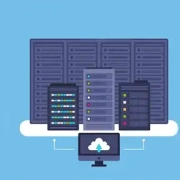In computing and the computer industry in general, a server is a component that provides functionality to other programs or devices. Servers can offer various capabilities, often referred to as services. The following text aims to introduce servers and the general concept of renting server space.

A server is a program or computing device that provides services to another computer program and its user. In a data center, the physical computer on which the server program runs is also commonly referred to as the server. This device may be a dedicated server or may be used for other purposes.
A physical server is a computer used to run server software. A virtual server is essentially a virtual representation of a physical server. A virtual server includes its own operating system and specific programs, all of which are maintained separately from other virtual servers that might be running on the same physical server.
The process of creating virtual servers involves installing a lightweight software component called a Hypervisor on the physical server. The role of the hypervisor is to prepare the physical server to act as a host for virtualization.
An administrative console allows managers to allocate specific hardware resources to each virtual server. This significantly reduces hardware costs since a single physical server can run multiple virtual servers.
The main reasons for renting server space include:
Request a supercomputer!

Renting server space works by paying a monthly fee to a company when you rent your server. The company is responsible for setting up and maintaining the hardware for your server and is available full-time to assist you if needed. The server is stored with 24/7 monitoring and security in data centers. It is also connected to high-level networks so you can access the server from anywhere in the world.
There are two types of server rentals: cloud servers and dedicated servers.
Dedicated Servers:
Dedicated servers are suitable for stable applications that require substantial amounts of CPU, memory, and disk resources. Dedicated server hosting is done on a monthly basis.
Cloud Servers:
Cloud servers are best suited for smaller applications that can be distributed across several servers, or for any application that starts small but may need to scale over time. Cloud servers offer high accessibility and are built for maximum uptime, as they are designed with extensions for all processors, memory, and storage. As virtual servers, cloud servers can be immediately deployed and used.
Cloud servers are excellent for applications like web servers, email servers, or any other hosted program. Dedicated hosting is a good choice for high-demand projects that do not require as much access, such as machine learning, large databases, or large web servers.
Both types of servers provide root access and the option to choose an operating system. Each server has its own dedicated IP address, and both offer a comprehensive and accessible control panel for managing all aspects of hosting.
When choosing a server, there are many factors to consider, including the combination of virtual machines and containers. The importance of specific components is evaluated based on use cases. Security features are also critical, and a number of protective, identification, and recovery features should be considered, such as encryption of data in transit and at rest, as well as continuous event logging to maintain an immutable history of all activities.
If the server relies on internal memory, choosing the type of disk and its capacity is also important, as this can significantly impact (input/output) and the flexibility of the server. Many organizations are reducing the number of physical servers in their data centers as virtualization allows fewer servers to host more workloads.
The rise of cloud computing has also changed the number of servers that an organization needs to host on-site. Packing more into fewer boxes can reduce total capital costs, floor space requirements for the data center, and cooling and power needs.
Hosting more workloads in fewer boxes can also create higher risks for businesses, as a server failure or the need for regular maintenance can impact more workloads.

Renting server space is one of the most logical and reasonable ways to access server space, especially if you’re looking to cut costs or struggling with space limitations. By renting a server, based on your needs (cloud or dedicated), you can solve your space and performance requirements in your workspace.
What is a server?
A server is a computer or system that provides resources, data, services, or programs to other computers, known as clients, over a network. A single system can provide resources and also use a system for its own needs.
What does renting a server mean?
Renting a dedicated server means a company rents the entire server unit to a customer. Simply put, only your data is stored on that server. Dedicated server rental is contrasted with shared servers, and it works almost the same way.
Do companies rent servers?
Many companies rent a dedicated server on a monthly basis. The server is then allocated or dedicated to the needs of the customer.